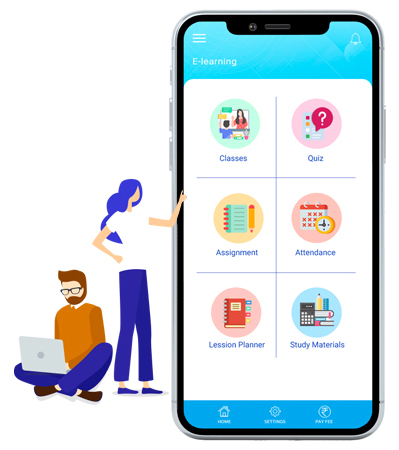An E-Learning Management System (LMS) is an essential component of modern education technology that facilitates online learning, student evaluation, and interactive engagement. Here are key features and benefits of an E-Learning Management System, including online student evaluation:
Features
1. Online Course Delivery:
- Provides a platform for schools to deliver course content, including lectures, assignments, quizzes, and multimedia materials, online.
2. Student Registration and Enrollment:
- Allows students to register for courses and enroll in specific classes or modules within the system.
3. Interactive Learning Tools:
- Offers interactive features such as discussion forums, chat rooms, and collaborative project spaces to foster student engagement and peer interaction.
4. Assessment and Evaluation:
- Enables educators to create and administer online assessments, quizzes, and exams, including auto-grading features.
5. Student Progress Tracking:
- Monitors and tracks student progress in real-time, providing insights into completion rates, grades, and areas where students may need additional support.
6. Customizable Learning Paths:
- Allows educators to create personalized learning paths for individual students based on their performance and needs.
7. Data Analytics:
- Provides data analytics and reporting tools to assess student performance and identify trends or areas for improvement.
8. Collaborative Learning:
- Supports collaborative learning by enabling students to work together on group projects, share resources, and engage in discussions.
9. Communication Tools:
- Offers communication tools for students and teachers to interact, seek clarification, and receive feedback.
10. Mobile Accessibility:
- Provides mobile-friendly access, allowing students to learn and engage from anywhere, on any device.
Benefits
Flexibility:
Offers flexibility in learning, allowing students to access course materials and engage with content at their own pace and schedule.
Personalization:
Tailors learning experiences to individual student needs, improving learning outcomes.
Data-Driven Insights:
Provides educators with data-driven insights into student performance, enabling targeted interventions and support.
Engagement:
Fosters student engagement through interactive features and collaborative tools, making learning enjoyable and effective.
Accessibility:
Expands access to education, accommodating diverse learning styles and needs.
Efficiency:
Streamlines administrative tasks such as grading and attendance tracking, freeing up educators' time for instruction.
Scalability:
Scales to accommodate the needs of both small and large educational institutions.
Continuous Improvement:
Supports continuous improvement by providing data for curriculum enhancement and instructional adjustments.
An E-Learning Management System enhances the learning experience by offering a dynamic, interactive, and data-driven approach to education. It empowers both educators and students to thrive in the digital age of learning.



